#bráulio mantovani
Explore tagged Tumblr posts
Text


Cidade de Deus, 2002
#crime#drama#cidade de deus#city of god#fernando meirelles#kátia lund#paulo lins#bráulio mantovani#douglas silva#resourcefulness
14 notes
·
View notes
Text
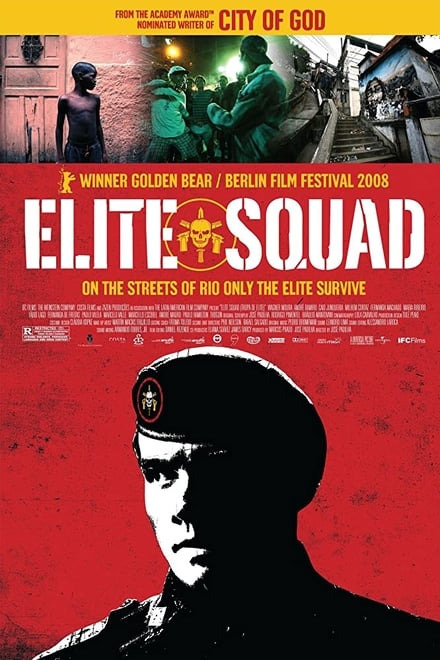
Movie #67 of 2023: Elite Squad
#elite squad#José Padilha#rodrigo pimentel#Bráulio Mantovani#Luiz Eduardo Soares#André Batista#Pedro Bromfman#Lula Carvalho#Daniel Rezende#action#crime#drama#portugese#greek#english#spanish#latin#german#italian#35mm#2007#67
5 notes
·
View notes
Text
THE CITY of GOD (2002)

source: https://www.tumblr.com/haveyouseenthismovie-poll/741533480021803008?source=share
City of God (Portuguese: Cidade de Deus) is a 2002 Brazilian epic action crime film directed by Fernando Meirelles and Kátia Lund. Bráulio Mantovani’s script is adapted from the 1997 novel of the same name written by Paulo Lins, but the plot is also loosely based on real events. It depicts the growth of organized crime in the Cidade de Deus suburb of Rio de Janeiro, between the end of the 1960s and the beginning of the 1980s, with the film’s closure depicting the war between the drug dealer Li’l Zé and vigilante-turned-criminal Knockout Ned. The tagline is “If you run, the beast catches you; if you stay, the beast eats you.”
youtube
1049-1LINK https://youtu.be/ASPvpdaQpRQ
Most of the actors were residents of favelas such as Vidigal and the Cidade de Deus itself.

City Of God received widespread critical acclaim and garnered four nominations at the 76th Academy Awards; Best Cinematography (César Charlone), Best Director (Meirelles), Best Film Editing (Daniel Rezende), and Best Writing (Adapted Screenplay) (Mantovani). In 2003, it was Brazil’s entry for the Academy Award for Best Foreign Language Film, but it did not end up being nominated as one of the five finalists. It is frequently listed by many critics and audiences as one of the greatest films of the 21st century and one of the best films of all-time.
The following list are the films THE CITY OF GOD lost too.

Meirelles and Lund went on to create the City of Men TV series and its 2007 film adaptation, which share some of the actors (notably leads Silva and Darlan Cunha) and their setting with City of God.
City of God (2002 film) — Wikipedia IMdB 8'6
THE FILM
1049-2 LINK https://ok.ru/video/7841985071667
notes:
City of God (2002 film) — Wikipedia
76th Academy Awards — Wikipedia
0 notes
Photo




Cidade de Deus (2002) dirs. Fernando Meirelles & Kátia Lund
“Sun is for everyone, beach for a few.”
#favorite#favorite films#cidade de deus#cidade de deus 2002#city of god#city of god 2002#fernando mireilles#katia lund#female director#brazilian cinema#paulo lins#bráulio mantovani#alexandre rodrigues#leandro firmino#phellipe haagensen#alice braga#roberta rodrigues#movies#films#stills#movie stills#film stills#film#cinema#filmista
106 notes
·
View notes
Photo










Cidade de Deus (Fernando Meirelles & Kátia Lund, 2002).
#fernando meirelles#kátia lund#cidade de deus#cidade de deus (2002)#paulo lins#bráulio mantovani#alexandre rodrigues#césar charlone#daniel rezende#tulé peak#bia salgado#inês salgado#ciudad de dios#city of god#city of god (2002)
85 notes
·
View notes
Photo

City of God (Fernando Meirelles and Kátia Lund, 2002)
Cast: Alexandre Rodrigues, Leandro Firmino, Phellipe Haagensen, Douglas Silva, Jonathan Haagensen, Matheus Nachtergaele. Screenplay: Bráulio Mantovani, based on a novel by Paulo Lins. Cinematography: César Charlone. Production design: Tulé Peak. Film editing: Daniel Rezende. Music: Ed Côrtes, Antonio Pinto.
City of God is an exceptionally involving docudrama that employs non-professional actors to stunning effect. The only experienced professional in the cast was Matheus Nachtergaele, who plays the drug dealer known as "Carrot." The rest were mostly recruited from the streets and slums of Rio de Janeiro, and put through several months of training, largely under the supervision of Kátia Lund, who also worked with the cast during filming and is billed as "co-director." Lund had become familiar with Rio's slum-dwellers through her work on music videos and documentary films. The shape of the film, including its flashback structure and use of quick cutting and hand-held camera, is largely that of Fernando Meirelles, whose later work includes coverage of the opening ceremony of the 2016 Olympics in Rio. And that reliance on flashy camerawork and narrative tricks is, I think, the greatest flaw of City of God. It detracts from some of our involvement in the lives of its characters, turning away from documentary-like reality into sheer "movie-making." Nevertheless, the film successfully immerses us in the violent lives of the people of the favelas. It was a significant critical and even commercial hit, earning four Oscar nominations, a rare feat for a foreign-language film, although it wasn't submitted by Brazil for the foreign-language Oscar. Instead it was nominated for best director, best adapted screenplay, cinematography, and film editing. Some controversy arose when only Meirelles was cited in the directing nomination, but the Academy has strict eligibility rules, and Lund's credit of "co-director" was judged to be a disqualifier. Given my reservations about Meirelles's use of the camera, I think maybe Lund deserved the nomination more than he did.
4 notes
·
View notes
Text
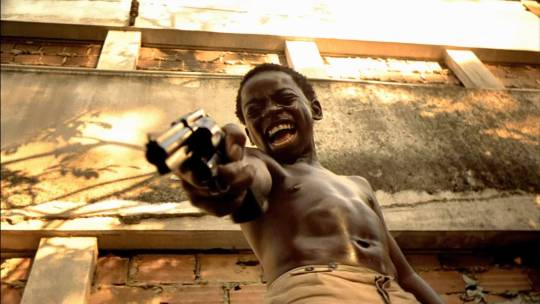
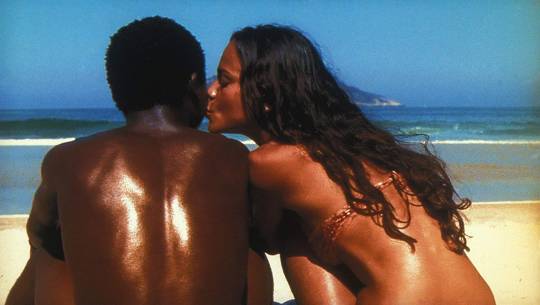
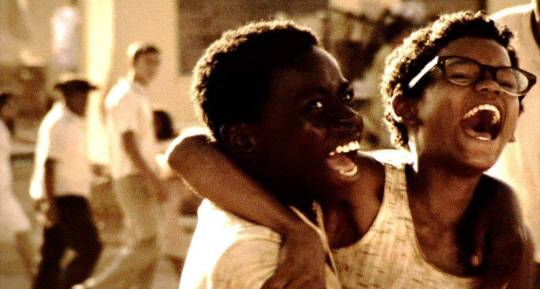
City of God (2002)
"If you run, the beast catches you; if you stay, the beast eats you."
We find ourselves in the City of God. A city that lucks everything we have seen. In this city gangs, drugs and violence are dominant. Life is tough, and you have to fight in order to survive. If you are lucky you could live through the age of 20 but you will lose something far more important, your childhood. "Rocket" is a child living in the City of God in the 60s and the only thing that he loves is photography. But sometimes you cannot choose your future.
This movie is so powerful and authentic unlike anything else I have ever seen. And that is because it screams "Reality". It shows us, how difficult life is for some people in ways that we cannot even imagine. Away from the comfort of our lives. The movie doesn't overreact. It isn't polite. It's goal isn't the happy ending. It's goal is to show you simply how things are. The cost of life is nonexistent, survival can be accidental in a gang-ruled city and with the police being absolutely absent and bought.
Based on the book of the same name by Paulo Lins, who moved to the "City of God" at the age of 7, this movie was a huge success in Brazil and was nominated for four Oscars and many other awards. It is absolutely worth seeing, but you should be prepared for something you have never seen before!!
Genre: Drama, Crime
Directed by: Fernando Meirelles
Written by: Bráulio Mantovani, Paulo Lins
#cityofgod#cidade de deus#drama#dramamovie#crime#crime movie#movies#movie#alexandre rodrigez#leandro firmino#2002movie#movie recommendation#moviesuggestion#movieoftheday#riodejaneiro#brazil#foreignmovies#cinematography#cinema#fernando meirelles
25 notes
·
View notes
Text



City of God (2002)
Director: Fernando Meirelles, Kátia Lund / Writer: Bráulio Mantovani
31 notes
·
View notes
Text
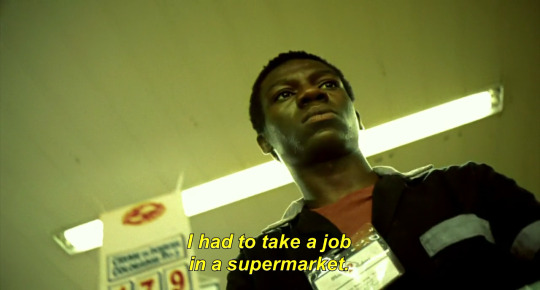
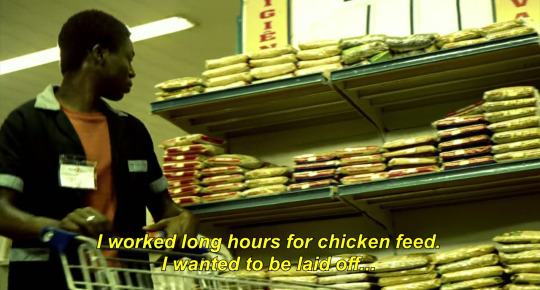
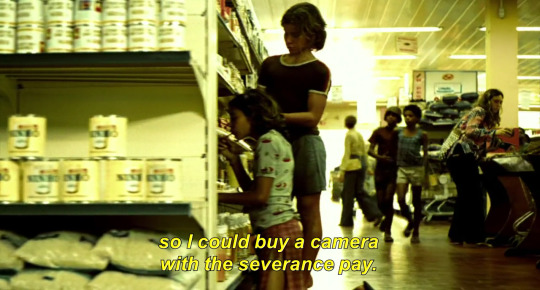
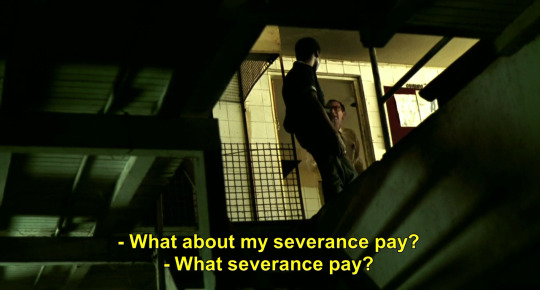
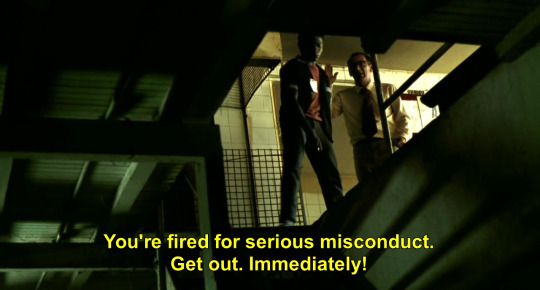
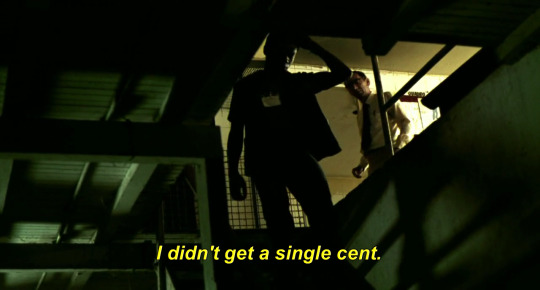
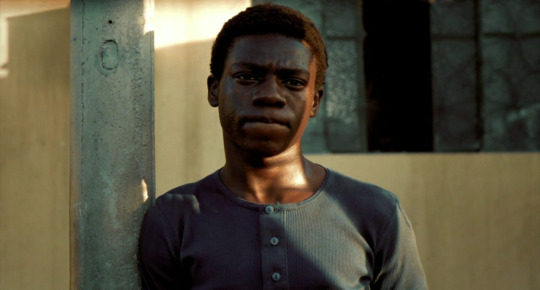
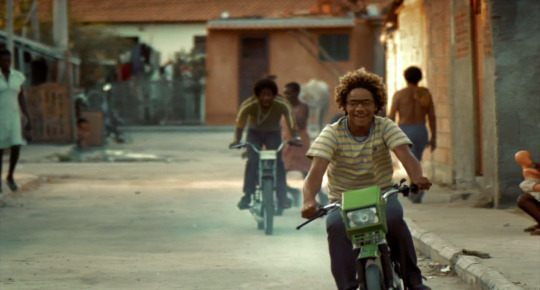
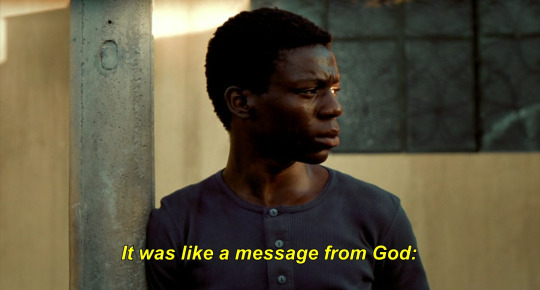
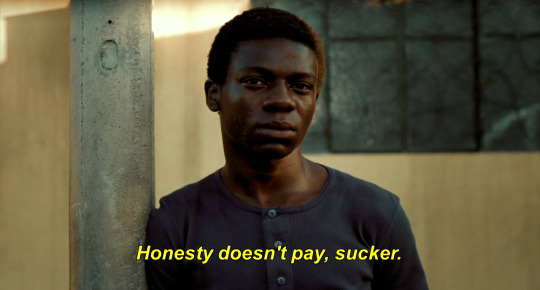
Cidade de Deus, 2002
#crime#drama#cidade de deus#city of god#fernando meirelles#kátia lund#paulo lins#bráulio mantovani#alexandre rodrigues#leandro firmino#phellipe haagensen#guti fraga#morality
76 notes
·
View notes
Text
O Ano em que meus Pais Saíram de Férias (2006)
O Ano em que meus Pais Saíram de Férias
Direção: Cao Hamburger;
Roteiro: Claudio Galperin, Cao Hamburger, Bráulio Mantovani e Anna Muylaert;
Gênero: Drama;
País: Brasil.
Quando se faz necessário adotar um ponto de vista infantil, Cao Hamburger é especialista: haja visto sua obra de maior sucesso e reconhecimento público - o clássico seriado Castelo Rá-Tim-Bum, exibido pela TV Cultura no final dos anos 1990. Neste filme de 2006, o enredo debruça-se sobre o cotidiano abafado e comprimido dos anos de chumbo da ditadura civil-militar brasileira através das acepções, percepções e do cotidiano de Mauro (Michel Joelsas), um garoto de 12 anos apaixonado por futebol. Não é incomum à cinematografia brasileira, a produção de filmes que contemplem este período sombrio da nossa história recente. A grande diferença que O Ano em que meus Pais Saíram de Férias guarda com relação aos demais filmes sobre a ditadura consiste justamente no ponto de vista adotado pela narrativa: o horror da ditadura não nos é apresentado explicitamente, mas através do olhar do garoto que, sem compreender, é enviado para morar com o avô em São Paulo, enquanto seus pais precisam entrar na clandestinidade. O filme é inequivocamente triste, porque registra com habilidade o cotidiano amargurado daqueles dias, ainda que Mauro não compreenda objetivamente a situação imposta, ele filtra os sinais e as atitudes dos sujeitos que estão em seu redor.
O ano é 1970; o país enfrenta o período mais grave da ditadura civil-militar - o governo de Garrastazu Médici; é ano de Copa do Mundo e a seleção brasileira almeja conquistar seu tricampeonato. Em Belo Horizonte, os pais de Mauro - Bia (Simone Spaladore) e Daniel (Eduardo Moreira) - preparam-se às pressas para entrarem na clandestinidade. Segredando do garoto o real motivo do desaparecimento (na percepção do menino, seus pais estão entrando de férias e deverão estar de volta antes do início da Copa), Mauro é deixado na porta do prédio onde vive seu avô (Paulo Autran), no bairro do Bom Retiro, em São Paulo. Acontece, no entanto, que seu avô sofrera um infarto naquela mesma manhã e falecera. Por isso, Mauro passa a viver com o vizinho Shlomo (Germano Haiut), um judeu ortodoxo idoso e um tanto quanto rabugento. Para se adaptar às novas circunstâncias, ambos deverão deixar de lado suas diferenças. É neste ambiente - e cercado por judeus - que Mauro viverá experiências definitivas: amadurecimento, espiritualidade, sexualidade, etc., sem, no entanto, deixar de esperar pelo retorno de seus pais.
Se pensarmos, por exemplo, na canção Aos Nossos Filhos, de Ivan Lins e Vítor Martins - “Perdoem a cara amarrada / perdoem a falta de abraço / perdoem a falta de espaço / os dias eram assim (...)” - , que registra a voz de um sujeito-lírico dirigindo-se aos filhos para tentar justificar a ausência naquele período sombrio, poderemos propor hipoteticamente que o ponto de vista de Mauro coaduna-se com a letra da canção. E que é sempre necessário reiterar: os dias eram daquela forma - sombrios, terríveis e violentos - ainda que alguns insistam em negar os fatos.
P.S.: quem assistir à subida dos créditos finais, terá o prazer de escutar a canção Tropicália (Caetano Veloso) na belíssima voz da cantora Céu.
⭐ 4.3 / 5.0




#Filme#Movie#Drama#Drama movie#O Ano em que meus Pais Saíram de Férias#Cao Hamburger#Germano Haiut#Simone Spaladore#Caio Blat#Eduardo Moreira#Liliana Castro#Rodrigo dos Santos#Michel Joelsas#Daniela Piepszyk#Paulo Autran
9 notes
·
View notes
Video
vimeo
Bus 174 from Ânimo Leve on Vimeo.
Documentary depicts what happened in Rio de Janeiro on June 12th 2000, when bus 174 was taken by an armed young man, threatening to shoot all the passengers. Transmitted live on all Brazilian TV networks, this shocking and tragic-ending event became one of violence's most shocking portraits, and one of the scariest examples of police incompetence and abuse in recent years.
Directors: José Padilha, Felipe Lacerda (co-director) Writers: Bráulio Mantovani, José Padilha Stars: Sandro do Nascimento, Rodrigo Pimentel, Luiz Eduardo Soares
0 notes
Photo










Cidade de Deus (2002) dirs. Fernando Meirelles & Kátia Lund
“It was like a message from God: “Honesty doesn’t pay, sucker.”
#cidade de deus#cidade de deus 2002#fernando mireilles#katia lund#female director#brazilian cinema#paulo lins#bráulio mantovani#alexandre rodrigues#leandro firmino#phellipe haagensen#alice braga#roberta rodrigues#movies#films#stills#movie stills#film stills#film#cinema#filmista
12 notes
·
View notes
Photo

City of God (2002)
Welcome to the world's most notorious slum: Rio de Janeiro's 'City of God.' A place where combat photographers fear to tread, where Police rarely go, and residents are lucky if they live to the age of 20. This is the true story of a young man who grew up on these streets and whose ambition as a photographer is our window in and ultimately may be his only way out. [Original Release 2002] (Miramax)
Genres: Drama, Suspense/Thriller, Crime
Country: Brazil, France
Directed By: Kátia Lund, Fernando Meirelles
Written By: Paulo Lins, Bráulio Mantovani
Starring: Matheus Nachtergaele, Seu Jorge, Alexandre Rodrigues, Leandro Firmino, Phellipe Haagensen, Jonathan Haagensen, Douglas Silva, Roberta Rodrigues, Alice Braga, Darlan Cunha, Jefechander Suplino, Luis Otávio
0 notes
Text
Elite Squad (2007)
https://www.tellusepisode.net/elite-squad-2007.html

0 notes
Text
Cine Passeio completa seis meses de funcionamento com 100 filmes exibidos

Seis meses depois da inauguração, o Cine Passeio comemora os grandes números alcançados. Com as estreias desta semana, as duas novas salas públicas de cinema de rua da cidade, os Cine Ritz e Luz, ultrapassaram a marca de cem filmes exibidos em sessões pagas na programação e 39 mil tickets vendidos. A média é de quatro filmes novos e 1,3 mil tickets por semana.
“O grande público que o Cine Passeio recebeu em seis meses de atividades, é um indicativo de que a memória do cinema de rua ainda permanece e as novas gerações estão descobrindo como um ponto de encontro, revivendo os velhos tempos da Cinelândia de Curitiba”, afirmou a presidente da Fundação Cultural de Curitiba, Ana Cristina de Castro.
Os filmes contabilizados foram exibidos nas duas salas principais, seja nas sessões regulares de terça a domingo ou nas sessões especiais como as matinês infantis de domingo, e a sessão da meia-noite às sextas. Porém, as sessões gratuitas e as mostras temáticas no Espaço Valencio Xavier não fazem parte dessa soma, o que torna ainda mais surpreendente o número e a abrangente a conexão com o espaço.
“Que o novo espaço cultural atrairia interesse já era esperado, mas superou a nossa expectativa. Nos preparamos para entrar em operação com fluxo grande, mas os resultados estão além do esperado e crescendo, criamos um público cativo que apoia e divulga o espaço”, comemora Marino Galvão, diretor executivo do Instituto Curitiba de Arte e Cultura (ICAC), instituição que administra o Cine Passeio.
Programação
Em cartaz durante 11 semanas, com salas cheias até o último dia, o campeão de audiência foi o drama espanhol mais recente do diretor Pedro Almodóvar, Dor e Glória. Organizada pelos curadores do Cine Passeio, Marcos Jorge e Marden Machado, a programação contou com outros grandes destaques, como o Rocketman e Bacurau.
Dos cem filmes em cartaz neste semestre, 1/3 foram produções nacionais. Dar destaque aos filmes brasileiros, garantindo pelo menos um por semana foi um dos principais compromissos que os curadores tiveram, garantiu Marden Machado. “Nos primeiros meses sentimos a reação do público, para buscar o perfil. Assim conseguimos ajustar o programa idealizado por nós com a expectativa do público. Agora, após um ajuste fino conseguimos obter sucesso nessa seara, pautando sempre a diversidade”, disse o curador.
Os projetos constantes também são sucesso de público. O Cine da Meia-Noite é atração garantida para os amantes do terror. As sessões têm atraído grande público ao exibir novas produções do cinema do medo e suspense.
As crianças têm horário e sessões especiais, com as matinês de domingo que apresentam o cinema de rua a um público pouco comum. Acostumadas às salas em shopping, o Cine Passeio conquistou os pequenos principalmente nas férias, com sessões infantis todos os dias e aos domingos.
Mostra
Além das sessões diárias, outros encontros temáticos ampliaram o repertório dos filmes voltados a estudantes e amantes da sétima arte. Da maior relevância foi a 1ª Mostra Curitiba de Cinema organizada pelo espaço. O evento surgiu para homenagear o cinema paranaense e curitibano, apresentando títulos com a cidade como cenário.
Masterclasses
Com um semestre de atividade do complexo cultural, o audiovisual foi apreciado não só como um produto acabado, mas discutido e conversado.
Assim, a experiência cinematográfica não ficou limitada somente à sala de cinema. Foram diversos eventos relacionados ao audiovisual com renomados profissionais, como Bráulio Mantovani, Cláudia da Natividade, Alberto Flaksman, Paulo Sacramento, Bruno Barreto, Sylvio Back e Carolina Kotscho.
0 notes
Text
city of God analysis draft 1
CITY OF GOD
MOVIE YEAR 2002
Directed by
Fernando Meirelles
Kátia Lund ... (co-director)
Writing Credits (in alphabetical order)
Paulo Lins ... (novel)
Bráulio Mantovani ... (screenplay)
City of god analysis
Fernando Meirelles’ film City of God (2002) is based on the Brazilian novel of the same name by Paulo Lins (1996). City of God (Cidade de Deus) is the name of the favela .The film has attracted much critical acclaim due to its confrontation of the issues within the favela as well as the gritty realism with which it was shot and unabashed depiction of violence within the favela. The film is narrated by one of two central characters, Rocket, and tells the story of the lives of himself and Lil Ze, children who grew up in the Cidade de Deus in similar circumstances yet who chose separate pathways in life. In the film the character Rocket symbolises hope, as he dreams of becoming a photographer, and this is used as a vehicle within the film to portray imagery of the favela to both the media in Rio de Janeiro within the story, and to the viewer. Lil Ze is a child with the ‘taste for crime’ that grows up to be the favela’s most powerful and notorious drug dealer. The lives of the two are intertwined and ironically Rocket’s dreams of becoming a photographer are realised through his access to life in the favela and his depiction of the crimes perpetrated by Lil Ze and his gang.
The film’s opening and closing sequence include a 360 degree rotational shot of Rocket in the centre of a face off between the gangsters and the police, unsure of where to turn. This is symbolic of the story of the film in that his life can take one of either direction. The narrative is then broken down into a series of vignettes which tell the story of the favela and the central characters, and ultimately which path Rocket decides to take. This part showed us a sneak peek of the movie which would keep you interested in it.
When the tender trio robbers from the gas truck and come back to hide with the small kids playing football, where they throw the money up in the air. Rocket a good and calm boy didn’t run to get money. But his brother goose came and gave him money to go and give the parents which is what a really caring guy would do.
The other scene which caught my eye was when rocket and his friend was running back home and while they were running the narrator was explain about city of god as they ran thought it. Which I found was a nice way of explaining about the city without showing it in a different way.
The part where the tender trio robber the motel from those rich people, they through the police was on their way to the motel. Where they quickly ran out and stole a car as well. But on one them didn’t know how to drive that well and they ended up crashing into a bar where one of them god injured and couldn’t run to get away from the policeman who were coming after them. so two of them ran into the woods to hide in the trees.
The scene I found very magical in the first 21 minutes of this movie was the part of the water drop from the tree to the fish swimming around to the guys eyes. This scene was a really good transition that I really liked in the movie.
The next scene which kept me on pins, were when one of the boys from the tree started to leave and he wanted to go back to church, while he was walking the policeman were coming towards him but they didn’t shoot him or go after him they went after that boy behind him, who was just a random boy walking. They completely ignored the man from the hood and killed a innocent boy which they made him look as he killed himself.
At the end of the first 21 minutes they show that all the boys go back to their normal life. Where goose go back home and work with his father and promise that he won’t go back to the hood or robber anyone’s money, shaggy goes and live with a girl and her mother.
Overall from this movie what my views was it is amazing how the colors were used in different parts of the movie and the camera movement was alluring and it kept me in contact with the movie. The acting in the movie was outstanding and I was more interested to see how they were going through life if they would crake at any time but they kept strong and I would have never expected that kind of acting.
Reference:
The research I took was from this site.
https://en.wikipedia.org/wiki/City_of_God_(2002_film)
To get the director and the writers credit.
https://www.imdb.com/title/tt0317248/
One more research.
https://letterboxd.com/film/city-of-god/
0 notes